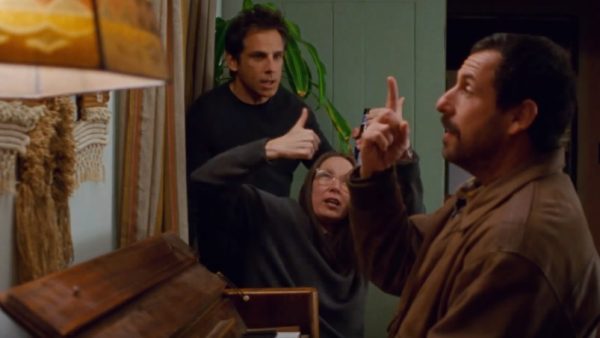The Meyerowitz Stories (New and Selected): You Know It’s the Same Release, by Scott Nye
As with Woody Allen, Noah Baumbach makes films about himself or the women he loves. I tend to prefer the latter, and the realization that The Meyerowitz Stories (New and Selected) would be both the former and a more self-conscious attempt at a major work gave me great pause indeed. Rare is oneself a fitting subject for a major film, and rarer does the attempt at significance yield precisely that. But The Meyerowitz Stories yields precisely that. Baumbach has released much of the pettiness that restrained so many of his prior films, recognizing instead that pettiness itself is an interesting behavior to study, and has crafted a film that is at once exacting and wild.
Adam Sandler stars as Danny Meyerowitz, a one-time piano prodigy who gave up music to raise his daughter (the disproportionately-beautiful Grace Van Patten), who is now grown and off to college at the same time her parents are divorcing, leaving unemployed Danny to go stay with his father, Harold (Dustin Hoffman). That’s how it starts anyway. Harold is a semi-successful sculptor (he’s made his living at it, but that’s never enough is it) who’s disappointed in how all his kids – each born from a different marriage – turned out for one reason or another. Those other kids are Jean (Elizabeth Marvel), an office worker, and the oft-discussed, late-to-surface Matthew (Ben Stiller), an accountant to the stars. Unlike his siblings, Matthew is successful, but not in an area Harold much respects, which is the same as not being successful at all.
Danny’s re-habitation with Harold has a way of drawing them all back together (or together for the first time, as they were mostly raised apart), but the interfamilial sparks kick up long before that point. The more Danny and Harold get to know and like one another, the more inevitable a spat becomes, until eventually Harold forces Danny into a borrowed tux for a decidedly-not-black-tie gallery opening by Harold’s oldest friend/rival L.J. Shapiro (Judd Hirsch) and nobody walks away happy. Harold has a real knack for getting under people’s skin, no doubt because people so easily seem to get under his, and Hoffman’s skill in rattling off Baumbach’s famously-abrasive dialogue as if it were nothing at all only underscores the hurt it’s meant to – and does – extract.
Sandler, by contrast, can be a terribly sweet and sensitive actor, and Danny in particular is an awfully sweet, sensitive guy. He towers over Hoffman, yet seems to slouch beneath him, plucking away at the piano as though he’s about to fall over, even when no one’s looking. Hoffman, by contrast, seems almost to be standing by back brace, never relaxed, always propping himself up. Pitting the two together reminds us of our own such relationships, the people we love who can’t love us back in the same way. Not that that stops us from trying.
Baumbach never lacked a talent for clever dialogue, but he and co-writer Greta Gerwig really honed that into a sharp, almost screwball-level form with his last film, Mistress America. He’s applied those lessons here to a dramatic arc, finding that the more quickly he and his actors can say things, the more strange obsessions they can interject. There comes a point at which Hoffman and Stiller are literally talking over one another, just listing their recent accomplishments in the hopes the other will stop talking about themselves and care. Even if it is a little on-the-nose, the imagination Baumbach has for subjects of conversation is remarkable, unrivaled in contemporary American cinema. Nobody comes this fast, this engaging, and this connected to the rhythms of his characters and what he wants to draw from them. And, yes, amidst all the drama, it’s one of his funniest films.
Shot on film by American Honey cinematographer Robbie Ryan, The Meyerowitz Stories has an autumnal feel that has, practically since the transition away from three-strip Technicolor, defined the look of New York-set films, or at least those of a certain literary bent expecting to be taken seriously. I can’t say it’s Baumbach’s most visually compelling work, but the camera has a way of keeping pace with the actors – Sandler’s bursts of anger especially – that keys us into the tonal shifts. It’s instead Baumbach and Jennifer Lame’s editing that stands out most in the aesthetic design of the film. Lame has a ruthless approach that alienated many in Manchester by the Sea, but which I find enormously effective, and she seems to have emboldened Baumbach to cut away mid-joke and let the audience fill in the rest. More than just cleverness, these unexpected rhythms are ideally suited to a film that deals first with losing one’s childhood home and eventually with serious illness and possible death.
The Meyerowitz Stories will be released Friday through Netflix in a push this year to represent some serious works of cinema, and I don’t blame those who will view it that way. But if a theater near you is showing it for a reasonable price, I recommend that route all the more. I howled like a goon for a good deal of this film. It’s a lot of fun to see with other people.


























